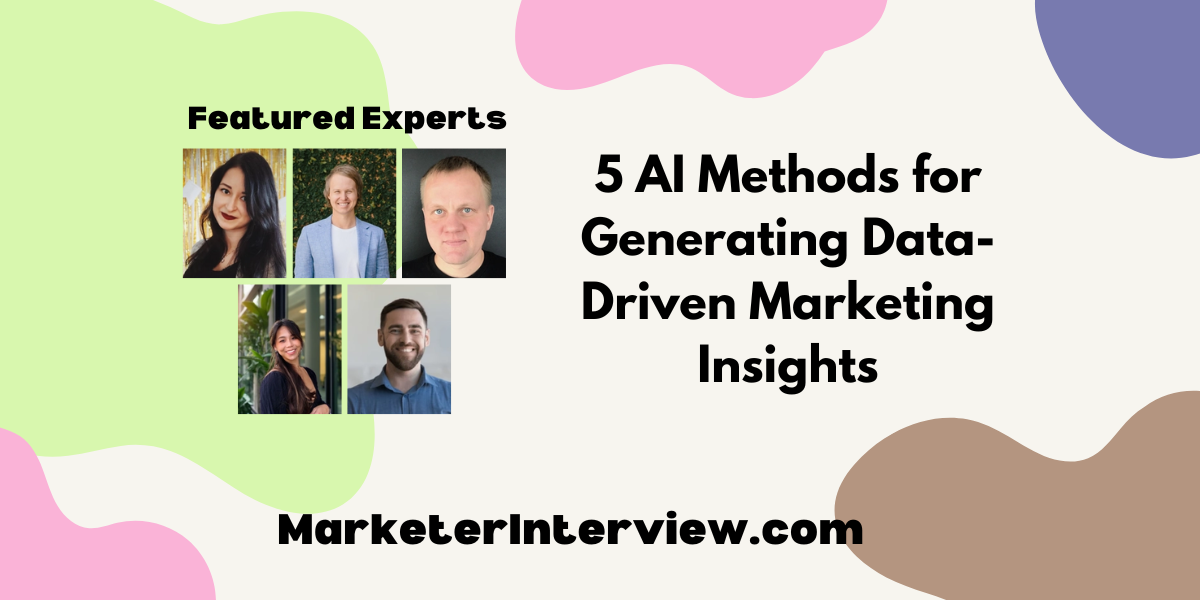5 AI Methods for Generating Data-Driven Marketing Insights
In the rapidly evolving landscape of data-driven marketing, we’ve gathered insights from five industry experts, including content marketing managers and CEOs, on harnessing the power of AI. From leveraging AI for data-backed content creation to gauging brand sentiment through AI analysis, discover the innovative methods these professionals are using to transform marketing insights.
Want to get quoted in MarketerInterview.com content just like this? Apply to become a contributor today!
Contents
Leverage AI for Data-Backed Content
As a content marketer, creating standout assets, like quantitative reports with original industry data, is impactful, but the data analysis process can be challenging. That’s why I’ve recently leveraged AI to analyze various sets of quantitative survey data.
These AI tools include ChatGPT’s Advanced Data Analysis feature and other plugins. They’re brilliant at processing large datasets, identifying patterns, and extracting actionable insights, which are crucial for creating data-backed content. One specific example is using AI for statistical analysis, such as chi-square tests, to help unearth correlations between variables, offering a deeper understanding of consumer behavior.
Thus, AI not only enhances the credibility of our content with original insights but also compensates for the lack of statistical expertise among marketers. In turn, I can create meaningful data-backed content and use my findings to make strategic marketing decisions as well.

Wisia Neo, Content Marketing Manager, ViB
Utilize AI Chatbots for Campaign Ideas
I find AI chatbots incredibly useful for generating fresh ideas and marketing insights. They’re like always-available brainstorming partners, ready to help me find new ways to serve my audience.
For example, you can start by feeding the chatbot a list of your best-performing posts. Then, ask it to define specific user personas and their pain points. Once you’ve established that, you can discuss how your brand can solve those problems and ask the AI to generate marketing campaign ideas.
Naturally, not every idea will be a winner, but I’m often surprised by the out-of-the-box directions the AI suggests when given enough context. I’ve used a combination of ChatGPT, Poe, and other tools, with Gemini Advanced being my current favorite.

Juliet Dreamhunter, Founder & AI Strategist, Juliety
Predict Purchase Intent with AI
We leveraged AI for in-depth consumer behavior modeling. We used machine-learning algorithms to analyze online interaction patterns.
The goal? To predict purchase intent. This method effectively segmented users—based on their digital footprints, past purchases, and engagement levels.
Real-time customization was crucial. AI facilitated personalized content and product recommendations, skyrocketing conversion rates.
Bottom line—it’s not just about collecting data. It’s about the smart application. AI empowers marketers to translate vast data sets into actionable strategies, driving measurable outcomes. The future of marketing is data-informed, not just data-driven.

Casey Jones, Founder, Head of Marketing, CJ&CO
Optimize Marketing Spend via AI
As the founder of Toggl, I’ve personally seen and experienced the power of AI in optimizing our marketing spend. We used machine-learning algorithms to analyze the ROI of various marketing channels. The AI technology helped us identify not just the most profitable channels, but also the best times and formats for our ads. This data-driven strategy led to more efficient use of our marketing budget, maximizing our reach while minimizing wasted spend.

Alari Aho, CEO and Founder, Toggl Inc
Gauge Brand Sentiment with AI Analysis
As a Marketing Head, one unique method I’ve employed to utilize AI in generating data-driven marketing insights is through AI-powered sentiment analysis. By leveraging advanced natural language processing algorithms, we analyze customer feedback, reviews, and social media conversations to gauge sentiment and identify emerging trends or issues. This allows us to understand how customers perceive our brand, products, and marketing campaigns in real-time.
By uncovering valuable insights from unstructured data sources, such as customer comments and online reviews, we can adapt our marketing strategies accordingly, address customer concerns proactively, and capitalize on positive sentiment to drive engagement and loyalty. This nuanced approach to sentiment analysis enables us to stay agile and responsive in our marketing efforts, ultimately driving better outcomes and fostering stronger relationships with our audience.

Alex Taylor, Head of Marketing, CrownTV
Want to get quoted in MarketerInterview.com content just like this? Apply to become a contributor today!






